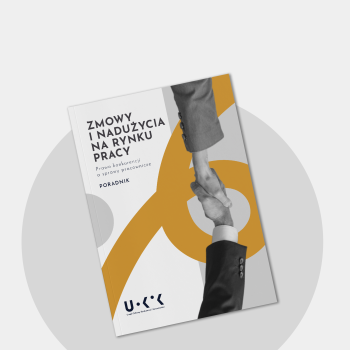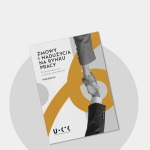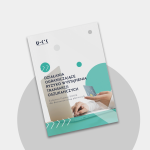
- The UOKiK guide on labour market collusions has been nominated for the Antitrust Writing Award.
- There is a chance for the document to win in the soft law & studies category.
- We are encouraging you to vote to our project in the Antitrust Writing Awards by the Concurrences website and the George Washington University.
The guide titled: “Collusion and Abuses on the Labor Market. Competition Law and Employees’ Matters” was published in July 2024. In a simple way, on the basis of individual cases attended by the publication heroes – Archie and Aurelia, it shows what practices may be deemed law violation. This is especially important as both employers and employees are frequently unaware that employee-related understandings may infringe competition and may end up with imposing a fine by UOKiK. Therefore, this publication is mandatory for heads of HR departments, too - the guide additionally explains why they also may violate the law and suffer from financial consequences in person. The guide has been promoted on UOKIK’s profiles on X website and Instagram, among other things, as well as in cooperations with the State Labour Inspectorate and the Ministry for Family, Labour and Social Policy.
Collusions on the labor market – vote for Archie in this election!
The UOKiK publication has been nominated for the Antitrust Writing Award organised by the Concurrences website and the George Washington University. The guide may become the best European publication in the Soft Law & Studies category.
- Our guide has been nominated for the award by specialists in the competition law - lawyers, economists and people of academia. Still, the best publication will be chosen by the jury composed of authorities and Internet users. Therefore, we are encouraging you to cast your vote to our publication - says Tomasz Chróstny, the President of UOKiK.
You may cast your vote until 21 March on the Concurrences website.
Collusions on the labor market – what is prohibited
We remind you that jointly setting wage levels by competitors for employees, for example lowering or setting an upper limit on salaries or not giving raises, known as wage-fixing, is prohibited. In such cases, colluding entrepreneurs eliminate the risk that an employee will leave after receiving a better offer from a competitor.
Another example of a law violation are agreements made by competitors not to compete for employees, known as no-poaching agreements. This way, entrepreneurs eliminate the risk of a competitor recruiting their employees. They might agree, for example, not to actively seek each other’s employees. Such arrangements can also take a more passive form, such as employers not pursuing a job interview if they receive a CV from an employee of the other party involved in the collusion.
Jointly setting other working conditions that affect an employer’s attractiveness, such as the number of remote work days, can also be prohibited.
Some fines are at stake for involvement in a competition-restricting arrangement – up to 10% of turnover for an entrepreneur and up to PLN 2 million for managers who are directly responsible for the prohibited practice.
The guide “Collusion and Abuses on the Labor Market. Competition Law and Employee Matters” may be downloaded from the UOKiK’s website.
Information for the media
| +48 603 124 154 | |
| biuroprasowe@uokik.gov.pl | |
 | pl. Powstańców Warszawy 1 00-950 Warszawa |
















